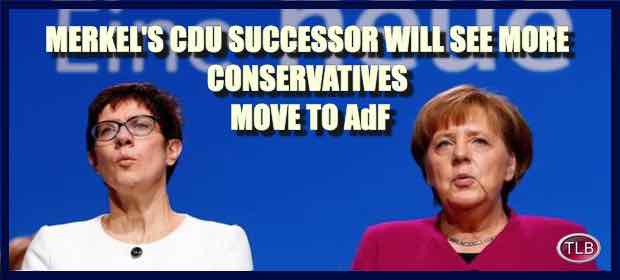
Germany: Merkel to be Succeeded by “Mini-Merkel”
- Annegret Kramp-Karrenbauer promised to hold a “workshop discussion” (Werkstattgespräch) on immigration and security. On all major policy issues, however, Kramp-Karrenbauer’s positions are virtually identical to those of Merkel.
- “Ms. Kramp-Karrenbauer is the continuation of Merkel by other means. She has supported the refugee policy and will not correct it.” — Alexander Gauland, Co-Chair, AfD party.
- “The CDU has not given convincing answers to the consequences of globalization and digitization…. The CDU lacks a clear vision of how prosperity and jobs are not only secured but expanded…” — The business newspaper Handelsblatt, in a commentary entitled, “CDU: The Divided People’s Party.”
 Annegret Kramp-Karrenbauer (left) and German Chancellor Angela Merkel react after Kramp-Karrenbauer was chosen to succeed Merkel as the next leader of the Christian Democratic Union party (CDU) on December 7, 2018 in Hamburg. (Photo by Carsten Koall/Getty Images) Annegret Kramp-Karrenbauer (left) and German Chancellor Angela Merkel react after Kramp-Karrenbauer was chosen to succeed Merkel as the next leader of the Christian Democratic Union party (CDU) on December 7, 2018 in Hamburg. (Photo by Carsten Koall/Getty Images) |
Annegret Kramp-Karrenbauer, a 56-year-old career politician committed to the status quo, has been chosen to succeed Chancellor Angela Merkel as leader of Germany’s Christian Democratic Union (CDU).
Kramp-Karrenbauer — often referred to as “Mini-Merkel” or “Merkel 2.0” because many view her as Merkel’s clone — won by just 35 votes (517 to 482) in a second-round run-off against her main opponent, a conservative named Friedrich Merz, at a CDU conference in Hamburg on December 7. Kramp-Karrenbauer’s extremely narrow victory (51.7% to 48.2%) revealed a party split down the middle.
Merz had pledged to pull the CDU back to its conservative roots, after two decades of leftward drift under Merkel’s leadership resulted in a mass defection of angry CDU voters to the anti-mass migration party, Alternative for Germany (AfD), now the third-largest in the German parliament.
Kramp-Karrenbauer, by contrast, promised only cosmetic changes to the status quo, apparently out of fear that substantive changes would alienate the Social Democrats (SPD), who currently form part of Merkel’s “grand coalition” government.
The failure to make a clear break with “Merkelism” means that not only might the CDU be unable to win back disaffected voters, but that even more CDU voters could be tempted to defect to the AfD in the next general election, due by October 2021.
In her inaugural speech as CDU leader, Kramp-Karrenbauer — also known as AKK because her full name is a mouthful to pronounce — confirmed her intention to follow along the liberal path established by Merkel. Kramp-Karrenbauer said that she does not want the party to undergo a “conservative revolution” and instead wants the CDU to occupy the “very broad center.” Merkel has long insisted that the CDU must be the “People’s Party of the Center,” and under Merkel’s watch, the party has often used the slogan, “The Center” (Die Mitte).
After disgruntled conservatives threatened to form a new party, Kramp-Karrenbauer swiftly pledged to emancipate herself from Merkel by “occasionally contradicting” the chancellor “where it is necessary” in the interest of the CDU. Kramp-Karrenbauer also promised to hold a “workshop discussion” (Werkstattgespräch) on immigration and security.
On all major policy issues, however, Kramp-Karrenbauer’s positions are virtually identical to those of Merkel. The German government’s basic positions (Grundsatzprogramm) on European integration, open borders, multiculturalism are unlikely to change without Merkel’s permission.
“Ms. Kramp-Karrenbauer is the continuation of Merkel by other means,” said AfD co-chair Alexander Gauland, paraphrasing the Prussian general and military strategist Carl von Clausewitz. “She has supported the refugee policy and will not correct it.”
AfD MP Alice Weidel predicted that Kramp-Karrenbauer will benefit the AfD more than the CDU:
“Mrs. Kramp-Karrenbauer is Merkel’s desired successor. Kramp-Karrenbauer means: Continuity! She is Merkel 2.0. With her, the leftward course of the CDU will continue, and thus the last conservative Christian Democrats have lost their fight and no longer have a political home in the CDU.”
One of the CDU’s best-known conservatives, Wolfgang Bosbach, observed:
“First, a narrow majority of the party wants a consistent continuation of the course of recent years — no course correction. Second, while values-conservatives and economic liberals continue to be needed to represent a broad political spectrum within the Christian Democratic Union (CDU) on the outside, internally they will not have a significant impact on the party’s agenda and policies.”
CDU Vice President and Merkel confidant Volker Bouffier, in an interview with Rheinische Post, warned Kramp-Karrenbauer not to revisit migration policy:
“We do not win the future by looking back. It may be wise to simply openly discuss the migration issue and take stock of it. But that cannot and should not be the central object of the party’s work. That’s not what we need now.”
Commentator Hugo Müller-Vogg, writing for Tichys Einblick, noted that Merkel is still the chancellor and that Kramp-Karrenbauer will remain in her shadow:
“Merkel remains the benchmark for voters. The new CDU leader can make the party more effective for the upcoming election campaigns, push ahead with the debate on the new basic program, take a more proactive approach toward the AfD. In the eyes of the population, however, all this is rather secondary. Crucial for the reputation of the CDU and its approval is the ‘performance’ of the chancellor. If people are not satisfied with the government’s policies, they cannot be lured with a more modern, digitally pimped-out party image. Then they will stay away or withdraw from the CDU….
“Merkel will undoubtedly continue to justify her 2015 refugee policy. The new CDU chairman wants to have ‘workshop discussions’ to determine what went wrong in 2015, why Merkel’s welcome policy has weakened the CDU and made the AfD really strong. Whatever will be written in the relevant papers, Merkel will not be willing publicly to concede her mistakes, not now or in the future. This means: Voters who left the CDU will not now make their peace with Merkel just because the CDU has a new chairwoman….
“If Kramp-Karrenbauer does not openly expel her predecessor from the Chancellery, she will only be able to act in Merkel’s shadow. This is because Kramp-Karrenbauer, who has risen from the secretary-general to the party chairman, remains, from Merkel’s point of view, what she has been all along: an assistant, not a partner at eye level.”
The business newspaper Handelsblatt, in a commentary entitled, “CDU: The Divided People’s Party,” warned that Kramp-Karrenbauer must focus on reuniting the CDU and strengthening the German economy:
“Angela Merkel has prevailed again: Annegret Kramp-Karrenbauer, her favorite, has been chosen as the new chairperson of the CDU. The delegates at the congress voted for continuity and against experimenting with Friedrich Merz.
“But with just under 52% of support, AKK has received the worst result of all party leaders in the history of the CDU…. The party is as divided as perhaps never before. Whether AKK manages to create unity out of this tattered party is rather uncertain.
“The rupture in the CDU between those who fundamentally support a continuation of the previous Merkel policies, and those who demand a radical renewal of political orientation, is deeper than many in the party leadership had expected….
CONTINUE READING HERE
ER recommends other articles by Gatestone Institute
Soeren Kern is a Senior Fellow at the New York-based Gatestone Institute. Follow Soeren Kern on Twitter and Facebook




